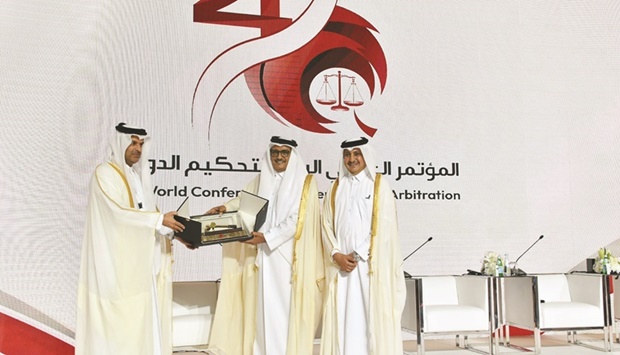Qatar is on path to develop its legislative structure in accordance with the best international standards as alternative means of settlement, particularly arbitration, has become one of the most prominent means of attracting foreign investments.
Addressing the 4th World Conference on International Arbitration, the Minister of Justice HE Masoud bin Mohamed al-Ameri emphasised Qatar’s keenness to develop an effective national arbitration system that adopts the best global standards.
This would be made possible in cooperation with all national partners, such as QICCA (Qatar International Centre for Conciliation and Arbitration) at the Qatar Chamber (QC), whose new rules will be issued soon to join the legislative and judicial systems in the field of international commercial arbitration, he said.
The number of arbitration rulings received by the administrative unit specialised in arbitration affairs at the Ministry of Justice stood at 41 in 2020, while the number of judgments in 2021 reached about 43 arbitration rulings between institutional arbitration and free arbitration, with a total value of claims of more than QR9bn, of which QICCA had the largest share, according to him.
"Qatar is on path to develop its legislative, legal, and judicial structure in accordance with the best international standards to achieve the rule of law and sustainable development and to uphold the principles of justice and human rights by promoting community awareness of international commercial arbitration and disseminating its culture," said the minister in the presence of QC and QICCA chairman Sheikh Khalifa bin Jassim al-Thani; QC first vice chairman Mohamed bin Ahmed bin Tawar al-Kuwari; QICCA board member for international relations Sheikh Dr Thani bin Ali al-Thani and other dignitaries.
The conference coincides with the fifth anniversary of issuing the Qatari arbitration law and the issuance of QICCA’s rules for conciliation and arbitration.
Underscoring the country's interest in international commercial arbitration, the minister said Doha has issued Law No. 2 of 2017 promulgating the Civil and Commercial Arbitration Law, whose principles and provisions were based on the UNCITRAL Model Law and the New York Convention on the Recognition and Enforcement of Foreign Arbitral Awards 1958, noting that Qatar issued Decree No 29 of 2003 ratifying the accession of Qatar to the Convention on the Recognition and Enforcement of Foreign Arbitral Awards.
The minister said the alternative means of settlement, in particular arbitration, had become one of the most prominent pillars of brighter economic development, and one of the most important means of attracting foreign investment.
Sheikh Khalifa said the arbitration process mainly contributes to encouraging foreign investments, as it removes the fears of foreign investors about the slow pace of local litigation procedures and offer them a quick settlement of their disputes without causing any damage to their investments.
"Arbitration has become a means of reassurance that protects and guarantees rights of the investors and preserves its capitals," he said, stressing that the transparency and clarity in the arbitration law in the host country have a direct correlation with the country's attractiveness to foreign investments.
Sheikh Khalifa indicated that the Qatar Arbitration Law, which was issued five years ago, instils confidence among international investors, especially in light of the economic boom witnessed by Qatar, the increasing demand of major global companies to invest in the state, and the existence of major infrastructure projects or those related to the 2022 FIFA World Cup and other promising sectors for investment in the country.

The Minister of Justice HE Masoud bin Mohamed al-Ameri; QC and QICCA chairman Sheikh Khalifa bin Jassim al-Thani and QICCA board member for international relations Sheikh Dr Thani bin Ali al-Thani at the World International Arbitration conference.

